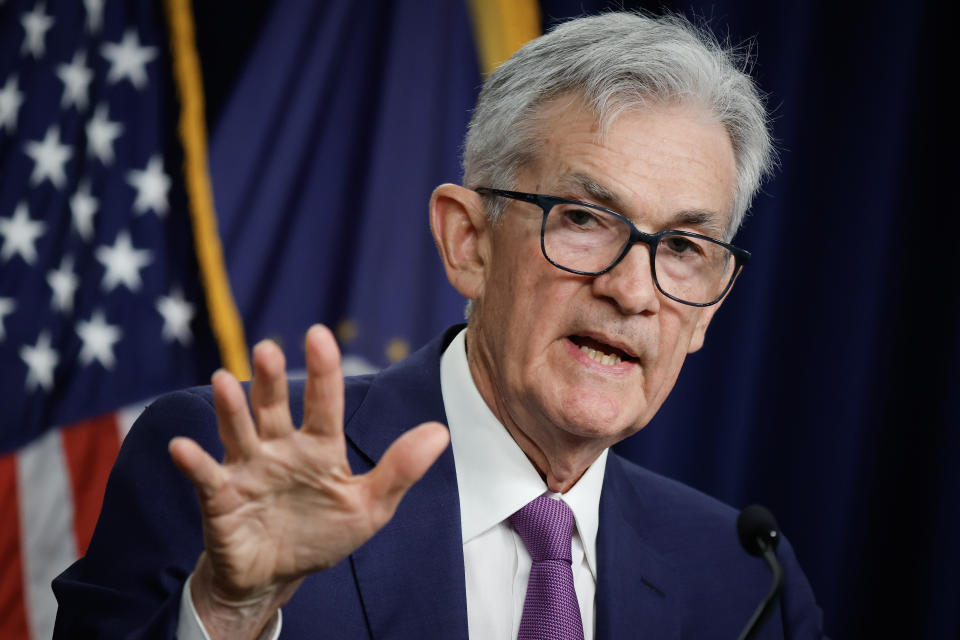Why I’m not doing anything to cope with lower interest rates

How should a retail investor deal with Wednesday’s interest rate cut by the Federal Reserve and with the future rate cuts that seem to be on the horizon?
What I plan to do is nothing. Which may be what you should do too.
How can I say “do nothing” when the airwaves, print media, and the internet are filled with advice and suggestions — and warnings — about how to handle the Fed’s rate cut?
Let me show you why my wife and I aren’t planning to do anything about the rate cuts, which will reduce our interest income but not threaten our overall financial well-being. And why you may not want to do anything, either.
Here’s the deal. The Fed has cut the federal funds rate to between 4.5% and 4.75% from the former 5% to 5.25%. Fed Chairman Jerome Powell has made it clear that the Fed is planning at least one more rate cut this year.
8/29/24
The Fed controls only this short-term rate, but lowering it puts downward pressure on longer-term rates as well. That’s great, of course, for many of us, making it easier and cheaper to borrow. But it’s not great for savers. That's because the income they get on their savings is going to decline.
Read more: The Fed rate cut: What it means for bank accounts, CDs, loans, and credit cards
We have significant cash holdings, which we keep in low-cost, high-quality money market funds. Our income from those funds, which has risen nicely over the past few years, is going to decline. But such is life.
Some people advise you to lock up yields by switching cash into long-term bonds or long-term certificates of deposit, whose interest rates are fixed and won’t fall because of the Fed’s rate cuts.
However, there’s a problem with doing that.
Locking up yields by buying long-term bonds or CDs makes your money illiquid. This exposes you to some long-term risks, such as having to sell at a loss if rates rise — which they will sooner or later, trust me —or if you need the cash that you’ve locked up long-term.
By contrast, if you’ve done what we have done — put our surplus cash into well-regarded, low-cost money market funds — your income will go down when the Fed’s rate cuts work their way through the financial system. But you’ve still got liquidity, the ability to access your cash on demand, which is very important.
The one thing that I won’t do — and that you shouldn’t do, either — is to put my money into a bank savings account, which typically pays yields approaching zero. The rates on those accounts aren’t likely to fall much, if at all, because they’re already so low.
So if you’ve got $3,000 or more of cash sitting in a bank savings account but don’t have a money fund account, you’ll probably do well to open an account in a low-cost, high-quality fund.
To be sure, unlike bank accounts, money funds aren’t backed by the Federal Deposit Insurance Corp. But there are plenty of high-quality, conservatively run low-cost funds. It’s a very competitive business, with $6.68 trillion in assets, according to Crane Data. They are highly unlikely to fail.
The most important thing for you to do now is to stay calm and remember that if you end up doing nothing to cope with lower interest rates, you’ll have plenty of company. Including me.
Update
Last July, I wrote a Yahoo Finance column with the headline, Warren Buffett is turning 94 next month. Should Berkshire investors start to worry? I said that Berkshire Hathaway stock had underperformed Admiral shares of Vanguard’s S&P 500 index fund since my wife and I bought Berkshire shares in January 2016.
Berkshire has since rallied and outperformed the S&P 500.
At Thursday’s market close, Berkshire was up 253% (15.6% a year) since we bought it. During that same period, the index fund has returned 242% (15.2% a year), according to Jeff DeMaso of the Independent Vanguard Adviser.
Score one for the Oracle of Omaha.
Allan Sloan, a contributor to Yahoo Finance, is a seven-time winner of the Loeb Award, business journalism’s highest honor.
Read the latest financial and business news from Yahoo Finance
Breaking news
See all






